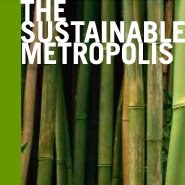
"With Miami's current building frenzy, the city needs to consider sustainable design principles urgently, and not only for environmental reasons. Indeed: such an earth-friendly approach is also a smart business investment, offering long-term profits and, in many cases, higher selling prices.
"The two-day Tropical Green conference will be an invaluable experience for architects, interior designers, developers, city planners, politicians, and voters in search of learning the ways of 21st century design that will both help the environment and their wallets."
It's 9-10 February 2006, down in sunny Miami: so check it out. (And can BLDGBLOG get a press pass? Pretty please?)

Meanwhile it's funny, but I'm reading The Drowned World by J.G. Ballard, even as I post this, and his descriptions – written in 1962 – of a flooded, neo-tropical London have totally changed my conception of what "a tropical city" actually is.
In Ballard's novel the sun has developed a kind of astrophysical Tourette's Syndrome, and it's started scorching the planet with radiation storms and UV bursts. This has melted the icecaps, raised the ambient global temperature to 120º+ and forced everyone to move to northern Canada and Siberia. (All of which actually happened to my family last year).
(Just kidding).
Anyway, London has become this kind of backed-up toilet of silt and Jurassic vegetation, "a nightmare world of competing organic forms returning rapidly to their Paleozoic past." Huge iguanas lumber around in the heat. Buildings left and right are collapsing, their lower six floors immersed in polluted seawater, "miasmic vegetation... crowding from rooftop to rooftop."
The city is fossilizing.
As Ballard writes: "A few fortified cities defied the rising water-levels and the encroaching jungles, building elaborate sea-walls around their perimeters, but one by one these were breached. Only within the former Arctic and Antarctic Circles was life tolerable."

[Image: The Drowned World's rather unimpressive cover...]
So the story goes that a research biologist is touring this neo-tropical London, boating from hotel to hotel across fetid lagoons, recording the types of plants that infest the city. Meanwhile monsoons are coming up from the south, everyone is dying of skin cancer and no one can sleep. The intensity of the sun's radiation is making everything mutate.
In between some eyebrow-raising moments of bad pop-Nietzschean pseudo-philosophy – the surviving humans find themselves psychologically regressing down the totem pole of evolution toward... something or other; it's all very psychedelic and 2001 – there are some cool descriptions of these new urban tropics:
"Giant groves of gymnosperms stretched in dense clumps along the rooftops of the submerged buildings, smothering the white rectangular outlines... Narrow creeks, the canopies overhead turning them into green-lit tunnels, wound away from the larger lagoons, eventually joining the six hundred-yard-wide channels which broadened outwards toward the former suburbs of the city. Everywhere the silt encroached, shoring itself in huge banks against a railway viaduct or crescent of offices, oozing through a submerged arcade... Many of the smaller lakes were now filled in by the silt, yellow discs of fungus-covered sludge from which a profuse tangle of competing plant forms emerged, walled gardens in an insane Eden."
Anyway, one could analyze the metaphors and all that – Ballard uses the word "competing" twice in the examples above (is he projecting a neo-Hobbesean vision onto Nature...? etc.) – but one could also find something better to do.
And, of course, one could also attend the sustainable design for tropical cities conference in Miami – and tell them you heard about it on BLDGBLOG...
No comments:
Post a Comment